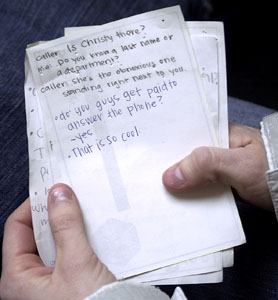Who you gonna call?
“Do you guys really get paid to answer the phone?” a confused student once asked a switchboard operator.
“Yes,” she assured him.
“That is so cool,” he responded.
The job of a switchboard operator is more than just “cool.” They handle between 1,500 to 2,000 calls everyday sending the callers to their desired destination, giving them a central role in the day to day operation of a university.
“They are the intial point of contact for the university. I think they have a big impact on people’s impressions,” Amy Kitchen, the business manager of telecommuncations services and a former switchboard operator, said.
The switchboard is located in what the operators refer to as a “windowless cave.” The small room hosts two computers tied into the phone system, a sink, a TV, a microwave and about fifty different phonebooks.
Any call, regardless of origin, that comes into Utah State University’s main number of (435) 797-1000, which appears on the school’s Web site, in phone books and other publications, is handled by the operators.
“Most are local calls,” Joni Moore, a junior majoring in nutrition who has been working as an operatior since the start of the Fall 2003 semester, said. “I do get about 4 – 5 international calls a day, though.”
USU employs eight operators with two working the phones during the day and one during the evening and on weekends. The switchboard is open from 7:30 a.m. until 10 p.m. on the weekdays, 8 a.m. to 10 p.m. on Saturday and 1p.m. to 7 p.m. on Sundays.
Most calls follow a simple pattern. “Utah State,” Moore greets the caller and after finding out who they wanted to speak with she types the name of the person or department into the telecommunications services billing database and with a couple of quick mouse clicks sends them on their way.
Not all calls are so routine, though, posted to the wall are a collection of handwritten transcripts of some of the operators’ favorite calls.
Operator: “Utah State”
Caller: “Yeah, is there a major office where I can go to find out what my major is?”
Operator: “Utah State”
Caller: “Hi, I need some information on the Aggiettes. My buddy is gonna set me up with one and I need to know if she’s cute or not.”
Operator: Utah State
Caller: “Um, I’m in the middle of the desert and all my chickens and turkeys have got some sort of an infection. I was told I should give you a call. Where do I go?”
A common frustration faced by operators is that the 797-1000 shows up on caller ID’s when ever a call comes from a campus phone. People see the number and call back to get the call they missed.
“It could have come from any phone here at USU, it could be from the dorms, from a department or the phones in the library,” Moore said. “There’s no way for us to know.”
Another frustration for some callers is when operators don’t have the information they wanted.
“We are a switchboard, not an information center. People get frustated when operators can’t answer their questions,” Kitchen said.
The switchboard has grown and advanced since it began in over thirty years ago. When Kitchen started working there, she and her fellow operators had to transfer the calls manually.
They also used to be able to give out any student’s information.
“Now all they can do is use the same Web site available to everyone,” she said.
The switchboard is ran through USU’s telecommuncations services which is also resposible for supplying service and billing for all of the phones on campus. They employ 16 people fulltime and another 12 students, including the eight operators.
“[Being an operator] is a great job for them. They get to help of the university and do some homework when calls are slow,” Scott Bradley, the director of telecommunications, said. “It’s good for us to because we can hire people out of it.”
Telecommuncations currently employs two former switchboard operators with a third one recently retiring.
-steveshinney@cc.usu.edu

Moore holds out some notes of just some of the unusual calls that the operators get in the telecommunications office. (Photo by Jessica Alexander)

